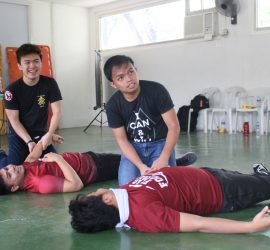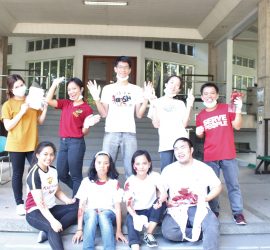There are many different ways to save a life. There are small ways, like sending someone a song, or maybe through prayer, or even a meme. Everyone, in their own small way is capable of saving a life. But at the end of the day, we have to realize that there’s a need for us to actually know how, and have the skills to literally save someone’s life. This is how I found myself at the National Engineering Center (NCE) on a Saturday morning at 8 AM. NSTP’s National Service Reserve Corps (NSRC) Training for First Responders was a three day program, consisting of various lectures and demonstrations on first aid. Despite my first aid background from being a member of the UP Red Cross Youth, I found there was still so much I needed to learn and develop as a first aider. The first day consisted of basic knowledge on first aid: the first half being lectures, and the second being learning bandaging skills. Led by Dr. Rodrigo Angelo Ong, Commander of the Medical Special Support Squadron, Philippine Coast Guard Auxiliary (PCGA), the lectures consisted of basic first aid knowledge: duties and responsibilities of first aiders, basic injury and bleeding management, with simulation activities and easy quizzes along the way. It was an intensive few hours of lectures in the morning, followed by a series of bandaging techniques for different types of injuries. I’ll be perfectly honest, waking up to be in UP at 8AM wasn’t the most ideal, especially since these days were rest days, but all the sessions proved that they were worth getting out of bed for. The second day, in particular, was my favorite. The first half of the training was emergency rescue and transfer. Our instructor was Mr. Ceejay Custodio, a trained first responder. He taught us basic need-to-knows for first aiders. Along with Mr. Irvin Calapre, Mr. Rhonie Ola and Mr. TJ Laurente, who are all members of the PCGA, they taught us how to do a full body inspection and take helmets off motorcycle patients with possible spinal injuries. The proper use […]
First Responders
The National Service Reserve Corps Diliman (NSRC) seeks to empower its pool of volunteers to become responsible citizens and take up leadership roles in improving the quality of environment and combat the damaging effects of disasters especially on vulnerable populations. The organization in partnership with the Office of the Vice Chancellor for Community Affairs initiated a project entitled: “Preparing NSRC Reservists as First Responders.” Philippine Red Cross (PRC), Quezon City chapter facilitated the four-day training which centered on Occupational First Aid and Disaster Risk Reduction Management (DRRM). The training which was held on October 14-15 and November 4-5, 2018 aimed to equip members of NSRC Diliman with practical knowledge and skills that are essential for them to be mobilized as First Responders who will act as first link in emergency medical services during disaster and help raise awareness on DRRM in the university. Reservists who volunteered to be part of the activity had a total of 32-hour hands-on training and practice which included hazard management during disasters, treating wounds and burns, recognizing and controlling bleeding, immobilizing fractures, moving and lifting victims and other basic lifesaving skills. Participants who have completed the training received a first aid certificate and license from the PRC and they will form part of the pioneer group of NSRC Diliman First Responders. by Vianne Grace C. Delfinado


